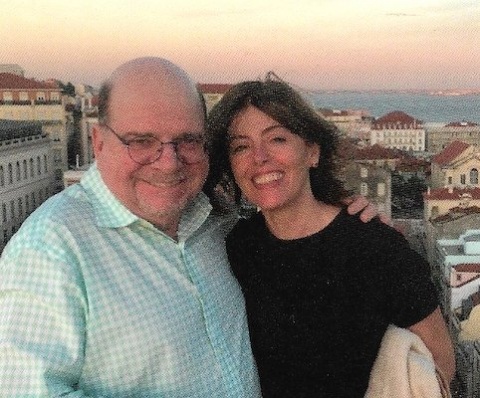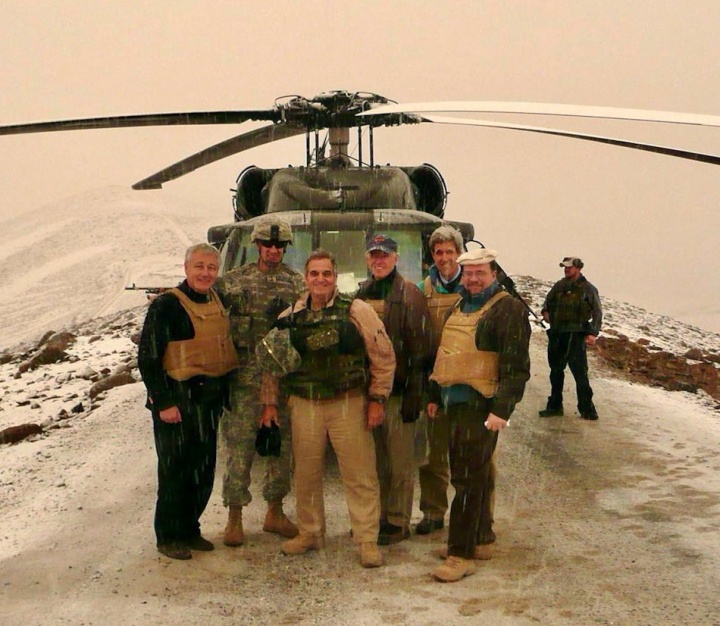Columbia College | Columbia University in the City of New York
Former U.S. Ambassador Reflects on C.C. and “Carmania”

Dell with his wife, Theodora, in Lisbon.
During his Foreign Service career, Dell received numerous awards and honors, including the Presidential Distinguished Service Award; the Ghazi Mir Masjidi Khan High State Award, from President Hamid Karzai of Afghanistan; the State Department’s Robert C. Frasure Memorial Award for his work in helping end Angola’s civil war; the Order of the Madara Horseman from the Republic of Bulgaria; and the Joint Chiefs of Staff Joint Service Award. He is currently working (albeit slowly) on a popular history of the Portuguese navigations, trying to study the Portuguese guitar (even more slowly) and, reflecting on the lasting influence of Professor Karl-Ludwig Selig and “The Quixit,” renovating a windmill in Portugal (this last more quickly).
What were you like when you arrived at Columbia?
I suppose I was a lot like most other 18-year-olds arriving on campus. I was excited and nervous, cocky and insecure, all at once. I grew up in New Jersey, near the Shore, but had never spent much time in New York, and certainly not on my own. So, it’s fair to say I was pretty inexperienced and had a lot to learn about life in the City. I came to the College thinking that I’d be pre-law and go into politics, but when I discovered that about 40 percent of my class had the same plans (and another 40 percent were pre-med), my contrarian nature kicked in and I began to rethink my plans. It wasn’t until my junior year that I discovered international relations in a course on strategic studies that I took with Professor Warner Schilling, and this awakened my interest in the Foreign Service as a career. The rest, as they say, is history.
What do you remember about your first-year living situation?
I lived in one of the Carman suites in the era when the (in)famous “Doc” Deming ran the dorm. My roommate was a very quiet fellow who spent most of his time in the library and left on weekends. We had different habits — he’d be up at dawn and asleep by 10:00 p.m. I was more or less the opposite. John left the dorms after that first semester (I believe he eventually left Columbia to enter a seminary) and my roommate for the second half of the year was from Panama. He was a great guy and gave me my first real contact with the Latin world, which has been a big part of my life ever since. The other two guys in our suite were both engineers and football players. Despite these differences, we all came from a similar background (today you’d say we came from working-class families, but at that time strong trade unions helped ensure that our families saw themselves as quite middle class). We hit it off well and roomed together again (in Carman again, sigh) in our sophomore year. We’re still in touch today. On the first day of freshman Orientation I met Nick Serwer ’78, LAW’81 on the food line at John Jay and it turned out he lived on the same floor of “Carmania.” We became lifelong friends; I owe my taste for Maryland blue claw crabs with Old Bay Seasoning (accompanied by a pitcher of Natty Bo) to Nick.
What Core class or experience do you most remember, and why?

Dell (right) on a mountaintop in Afghanistan with then-Senators Joseph Biden (D-Del.), John Kerry (D-Mass.) and Chuck Hagel (R-Neb.), along with the commander of the 101st Airborne Division and his political advisor.
Did you have a favorite spot on campus, and what did you like about it?
When I eventually escaped from Carman, I moved into Hartley; my window provided the only access to “The ‘T’ain’t” — the little covered passage connecting Hartley and the neighboring dorm (“’cause t’ain’t Hartley ’n’ t’ain’t Livingston”). It became our private terrace and a great place from which to rain snowballs down on passersby.
What, if anything, about your College experience would you do over?
I’d have taken greater advantage of New York. The possibilities that come with living in the city while in college is one of Columbia’s best sales pitches, I know, but I didn’t really use it to the fullest. The ’70s were one of the city’s low points and maybe it was less alluring for that reason. Fortunately, my wife, who was born abroad, first got to know the city in the ’90s and has never seen it with my jaded ’70s-survivor gaze. She wants to visit every chance we get, so I’m making up for lost time now.
More “Take Five”
- 1 of 32
- ›

